Government writes off £1.4bn of PPE from Covid deal
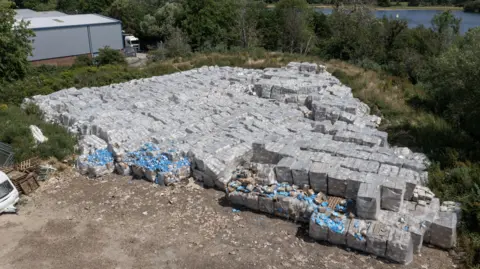 Getty Images
Getty ImagesAbout £1.4bn worth of personal protective equipment (PPE) has been destroyed or written off in what is understood to be the most wasteful government deal of the pandemic.
Figures obtained by the BBC reveal that at least 1.57 billion items of PPE provided by the NHS supplier, Full Support Healthcare, will never be used, despite being manufactured to the proper standard.
The Department for Health and Social Care (DHSC), which was responsible for purchasing and delivering Covid PPE, said: “We do not recognise the £1.4bn quoted. Our position on PPE stock is set out in the department’s annual accounts as audited by the National Audit Office."
The Labour Party described the contract as a "staggering waste" while the Liberal Democrats said it was a "colossal misuse of public funds".
Full Support Healthcare agreed a £1.78bn deal in April 2020 to deliver face masks, respirators, eye protection and aprons - the largest Covid PPE order from a single supplier, accounting for 13% of the government’s total spend.
Before the pandemic, the Northamptonshire-based company, which was already a specialist manufacturer of PPE, had 25 employees and annual profits of £800,000.
Any profits since the contract was fulfilled are not known because in 2021 the co-directors, Sarah Stoute, 50, and her husband Richard, 53, based the business offshore in Jersey for privacy reasons.
They and the company continue to pay all UK tax. Neither Full Support Healthcare nor the Stoutes have done anything improper.
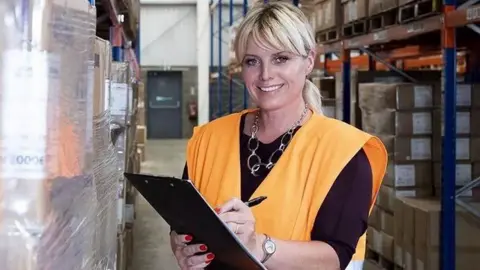 Full Support Healthcare
Full Support HealthcareBBC Investigations made a series of requests over a six-month period under the Freedom of Information Act to NHS Supply Chain, which manages the delivery of healthcare products.
The responses reveal that about £1.4bn worth of Full Support Healthcare's PPE will not be used.
The figure includes some 749 million items that have already been burned or destroyed, “including by energy from waste”, and a further 825 million that are classified as excess stock “where disposal and recycling are possible outcomes”.
Full Support provided 2.02 billion items of PPE, however, only 232 million items have been dispatched to the NHS or other care settings.
The deal is almost certain to be the most wasteful of the Covid pandemic. Data compiled by data firm Tussell, shows only one contract was more costly and it was awarded to a range of suppliers providing mixed services.
The government previously estimated that £85m worth of PPE secured under the contract would not be used, which is approximately 6% of the true total.
We have asked the DHSC to explain this disparity and why so much of the PPE was never used.
The BBC understands that at least £100m of public money has additionally been spent on storing and incinerating the excess stock since its purchase.
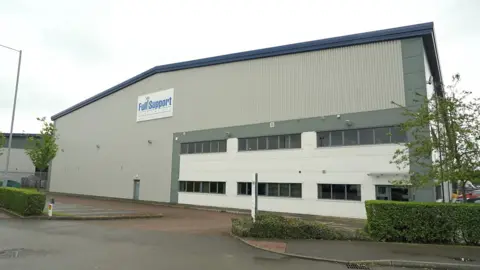
'Staggering waste'
Wes Streeting, the shadow health secretary, said the money lost "could have been used to pay the salaries of 37,000 nurses".
"We all know that billions of pounds was wasted during the pandemic on corruption and incompetence, but what the BBC has uncovered is the worst example I have ever seen - £1.4bn on one contract, paying for PPE that was never used.
"It is staggering waste and I think we need a full and frank account as to how so much public money was thrown down the toilet," he said.
The BBC contacted the DHSC and the Conservative Party several times with no reply to set out our findings and ask a number of questions.
In an earlier statement the government said it had "acted swiftly to procure PPE at the height of the pandemic, competing in an overheated global market where demand massively outstripped supply".
The Liberal Democrats said it would "take steps to ensure such a colossal misuse of public funds never happened again".
According to Peter Smith, a former government procurement adviser and author, the initial forecasts for how much PPE was going to be needed, "were far higher than they should have been... with enormous targets of tens of billions of items".
"I think the procurement people did what many of us would have done and slightly panicked to get the stuff in, or at least get the contracts in and hope the stuff arrived later - it was almost as though price didn’t matter.
"It meant opportunists and middlemen in entirely unrelated industries could make extortionate margins by organising supply from China or wherever, sometimes literally doubling their purchase price," he said.
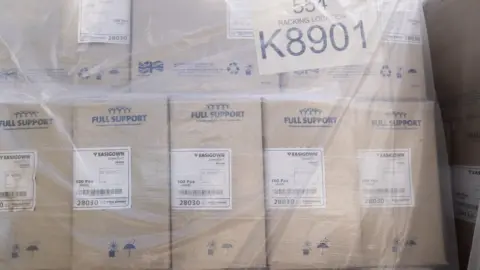 Getty
GettySarah Stoute, a former nurse, set up Full Support Healthcare in 2001 in Wellingborough and her husband became a director three years later.
As experienced providers of PPE during previous pandemics, they moved quickly in late 2019 to boost supply as Coronavirus broke out.
Under an existing arrangement with the NHS, their company won two DHSC purchase orders, including one for £1.78bn, for face masks and other items.
Speaking at the time, Mrs Stoute said volumes of their product, shipped from China, increased from “eight sea freight containers every month to 800”.
In a post on X, then known as Twitter, in October 2020 she wrote that her “team of 25 people” supplied “one fifth of the PPE national stockpile”.
She added: “I’ve paid a few people’s mortgages off this last few weeks.”
Afterwards, Mrs Stoute and her husband bought a £30m seafront villa in Barbados; a yacht; a £6m house in the south of England and an international equestrian centre in Bedfordshire.
Giving evidence to the Public Accounts Committee in 2021, she said they "risked everything as a company and went into mass production with no security at all".
There is no suggestion the Stoutes or their company did anything wrong.
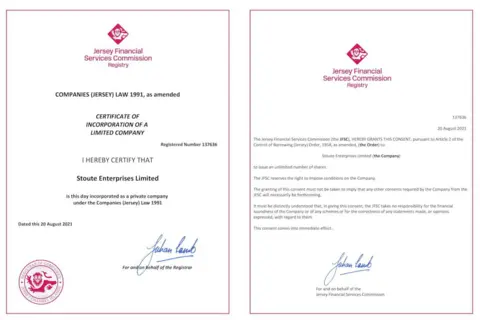
'Repeated press intrusion'
Lawyers representing the Stoutes said: “Full Support Healthcare stock arrived quickly by summer 2020, much earlier than most and in larger quantities.
“It had either a two- or three-year shelf life. This means the PPE products are more likely to have passed their use-by date.”
On the issue of the couple offshoring their business, their lawyers said: “The choice to have the group company resident in Jersey was solely to maintain privacy for our clients and their family, especially given the repeated press intrusion.”
The couple and their company remain registered in the UK for tax.
The Stoutes unsuccessfully brought legal action against News Group Newspapers in 2023 after the Sun on Sunday published images of them on a beach in Barbados.
A judge ruled the couple, who were photographed after taking jet skis from their boat to a nearby restaurant, did not have a reasonable expectation of privacy.
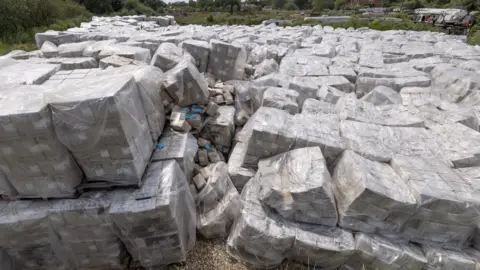 Getty
GettyLast summer the Environment Agency took enforcement action to clear a stockpile of thousands of boxes of waste plastic medical aprons supplied by Full Support Healthcare.
Documents obtained by the BBC in April show the dump on a farm near Calmore, Hampshire, ran to some 1,550 pallets and was considered to present a fire risk.
The government had sold the pallets to a third-party private company while in the process of auctioning off excess PPE.
Full Support was in no way responsible for the stockpile.
The company's lawyers said the Stoutes were only made aware of the volume of unused stock when the BBC told them.
They said it was a matter for the government who had not contacted them at any stage about it.
Four years since the first national lockdown in England and Wales, the DHSC continues to store and dispose of billions of items of excess PPE at a cost of millions of pounds a week.
At a press conference on Tuesday morning, the Health Secretary Victoria Atkins said the £1.4bn figure was "not accepted" but the DHSC has not specified a different one.
Ms Atkins said on the wider point "the whole country wanted us to get the PPE that our front-line staff needed both in healthcare and in social care, and we managed to procure billions of pieces of PPE equipment".
"That was absolutely the right thing to do at the time," she added.
A DHSC spokesperson said: “We do not recognise the £1.4 billion quoted. Our position on PPE stock is set out in the department’s annual accounts as audited by the National Audit Office.
“PPE was secured at the height of the pandemic, competing in an overheated global market where demand massively outstripped supply.
“Nearly half of all the remaining stock was sold, recycled, or donated by the department. In line with our reduction of storage and disposal strategy unused items will be turned into energy from waste which will see the department recoup further costs.”
Do you have a similar story to share with Jon? You can get in touch with him confidentially at [email protected]
